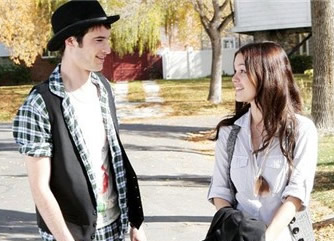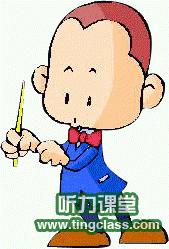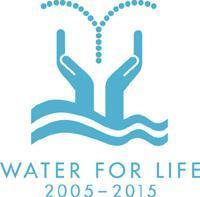更新日期:2012-03-24浏览次数:5087次所属教程:看电影学英语
听力原文
第一页:片段欣赏
第二页:巧学口语
第三页:小小翻译家
第四页:文化一瞥
精彩对白
Willie: I just gotta make sure that you're real children. It's very important with juggling. Not... not little goblins or anything like that. The child here is not real. It's an alien. All right. Okay. Really. I'm gonna... Whoa. Whoa.
Kid: Higher!
Jimbo: Food!
Kid: He gets paid 40 bucks. Isn't that right, Uncle Will?
Willie: We're gonna have to get Q-tips, because I said "ducks." I get paid in little fuzzy baby ducks.
Kid: Ducks?
Susan: Wait, wait. Wait, wait, wait. Is that really true, Willie? Do you really make $40 a day?
Willie: Uh, on a good day.
Susan: Wow. See?
Jimbo: Yeah? How much you paying in tax on that $40 that you're making?
Susan: Come on. You've gotta be kidding. Really, Jim?
Jimbo: What? I'm just curious. Does he pay tax on the money that he makes?
Willie: What's wrong with that? Should I?
Susan: You don't need to pay any income tax. Okay? Want some dessert? Maybe you'd like a cup of coffee or tea or something like that?
Willie: Yeah.
Jimbo: That's the solution... to the problem, Will. You just don't worry about it.
Susan: Problem? What problem? I mean, where's the problem? He... he doesn't have a problem.
Jimbo: He doesn't have a problem. He doesn't have a home.
Susan: Hey, guys. Eat your salad. Please. Thank you.
Jimbo: He doesn't have a job.
Willie: I have a home.
Jimbo: No. A room in some fleabag motel is not a home. Doesn't have any clothes. Doesn't have a car.
Willie: I had a car.
Jimbo: You had a car?
Willie: Yeah, but I hated it, 'cause I always had to put it somewhere.
Jimbo: Yeah. Life is tough, having to put that car somewhere.
Kid: Aren't pajamas clothes?
Willie: Can I tell you something right now? There's nothing like 'em. Just... just feel 'em. Feel 'em. Yeah. They're soft.
Kid: It's so soft.
Willie: They're cheap. And your legs... your legs... they're just as free as a bird. Just comes out of nowhere.
Kid: Oh, Uncle Will!
Willie: Kids. Go inside. Go. Go play. Come on. Give us a couple minutes.
Willie: Come to me. No?
Jimbo: You remember that TV show?
Susan: What TV show?
Jimbo: You remember. It was that, um... that news show, where you said that guy was Will. Anyway, Willie, so listen. There was this news program, okay? And there was this guy who had this cat. Now, all day long, he had to check the refrigerator... to make sure that he didn't put the cat inside of there.
Willie: The refrigerator?
Jimbo: That's right, Will. The refrigerator.
Willie: And the cat?
Jimbo: That's right, Will. The cat. He was nuts.
Susan: Hey. You know what? He wasn't nuts. He had a disorder.
Jimbo: Yes, Will. A disorder called F'ing nuts. Now, as soon as this lunatic closed the door, he had to open it again... to make sure that the cat wasn't inside. All day long, right? He was doing this. He was opening, closing, opening, closing. And he talked about it... talked about it very clearly. Like it was a very reasonable thing for him to do. Because who knows? Maybe the cat could have gotten in there, right? Before he saw it. Before he closed the door. And so Susan leans over to me, and she says, "That guy..." She says, "That's your brother." Hmm? She says, "That's Will with Emma. He can't help it." And you know what, Willie? She's right. She's right. Okay? You talk like following this woman around everywhere... is something that makes sense, but it doesn't. Okay? It doesn't make sense. It's called stalking, and it's against the law. And I want you to stop telling my kids that life is nothing but a bowl of cherries... and that everything is just peachy, okay? What life is, what isn't... that's my area. All right? I'll handle that topic with my kids, if that's all right with you.
[page]
第一页:片段欣赏
第二页:巧学口语
第三页:小小翻译家
第四页:文化一瞥

1. juggling: 杂耍,欺骗
He loves juggling with language, so much so that one often loses the thread of his argument.(他喜欢在语言上玩花样,弄得人家连他的论点也抓不住。)
2. goblin: 小妖精,顽皮的丑小鬼
3. Q-tips: 棉花棒,棉签
4. fuzzy: 有绒毛的,也可以表示模糊的,失真的
I tied it with fuzzy white yarn, and admired my work.(我用毛茸茸的白纱线把它系好,欣赏着我的杰作。)
5. dessert: 餐后甜点
6. fleabag: 廉价旅社,也可以指露宿用的睡袋
7. out of nowhere: 突然冒出来,莫名其妙的出现
8. disorder: 一般指不适;失调;疾病,这里指强迫症
Too rich a diet will disorder your digestive system.(过分油腻的饮食会使你的消化系统失调。)
9. lunatic: 疯子,疯人
10.make sense: 有意义,言之有理
It would make sense to leave early. 早点离开是明智的。
[page]
第一页:片段欣赏
第二页:巧学口语
第三页:小小翻译家
第四页:文化一瞥
 |
1. 这对变戏法很重要。
__________________________________
2. 不,廉价旅馆里的房间不是家。
__________________________________
3. 好像他这样做理所当然。
__________________________________
4. 是吗? 完全没有道理,这叫跟踪,是违法的。
__________________________________
[page]
第一页:片段欣赏
第二页:巧学口语
第三页:小小翻译家
第四页:文化一瞥
世界水日&历届主题
世界水日(World Water Day)是人类在20世纪末确定的又一个节日。为满足人们日常生活、商业和农业对水资源的需求,联合国长期以来致力于解决因水资源需求上升而引起的全球性 水危机。1977年召开的“联合国水事会议”,向全世界发出严正警告:水不久将成为一个深刻的社会危机,继石油危机之后的下一个危机便是水。1993年1 月18日,第四十七届联合国大会作出决议,确定每年的3月22日为“世界水日”。
虽然地球的储水量是很丰富的,共有14.5亿立方千米之多。但是其中海水却占了97.2%,陆地淡水仅占2.8%,与人类生活最密切的江河、淡水湖 和浅层地下水等淡水,又仅占淡水储量的0.34%。更令人担忧的是,这数量极有限的淡水,正越来越多地受到污染。人类的活动会使大量的工业、农业和生活废 弃物排入水中,使水受到污染。目前,全世界每年约有4200多亿立方米的污水排入江河湖海,污染了5.5万亿立方米的淡水,这相当于全球径流总量的14% 以上。并且还在增加,扩展和累积。
历届主题

1995年的主题是:“妇女和水”(women and water);
1996年的主题是:“为干渴的城市供水”(water for thirsty cities);
1997年的主题是:“水的短缺”(water scarce);
1998年的主题是:“地下水--看不见的资源”(ground water -- invisible resource);
1999年的主题是:“我们(人类)永远生活在缺水状态之中”(everyone lives downstream);
2000年的主题是:“卫生用水”(water and health);
2001年的主题是:“21世纪的水”(water for the 21st century);
2002年的主题是:“水与发展”(water for development);
2003年的主题是:“水——人类的未来”(water for the future);
2004年的主题是:“水与灾害”(water and disasters);
2005年的主题是:“生命之水”(water for life);
2006年的主题是:“水与文化”(water and culture);
2007年的主题是:“应对水短缺”(Coping with Water Scarcity )
2008年的主题是:“涉水卫生”(water sanitation)
2009年的主题是:“跨界水——共享的水、共享的机遇”(transboundray water-the water sharing, sharing opportunities)
2010年的主题是:“关注水质、抓住机遇、应对挑战”(communicating water quality challenges and opportunities)
2011年的主题是:“城市水资源管理”(water for cities)
2012年的主题是:“水与粮食安全”(Water and Food Security)